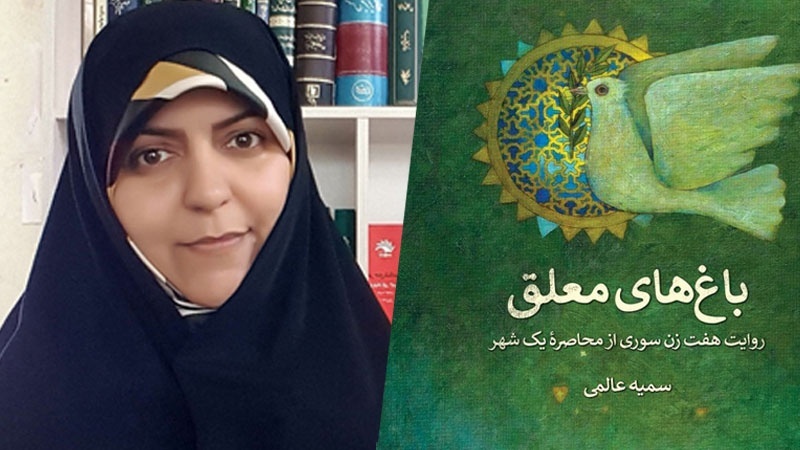Somayyeh Alami, one of the active Iranian story writers during the recent years and an outstanding figure of Resistance literature, was born in 1979. She has studied in herbal medicine and in 2009 gave up the MS of biotechnology and started story writing. Somayyeh Alami's activities have resulted in writing, authoring and publication of several novels, a book of stories and narrations.
This writer, who has been in Syria for nearly one year, has taught narration to the Syrian women, too. She has made use of her experiences of the workshop in authoring the book, "Hanging Gardens".
Somayyeh Alami said on the first idea of the book, "Hanging Gardens", "The idea of woman's relation with city and war and her role in peace has always been with me. I used to look for the place of woman in the ideal society or utopia. As for the Western utopia, whatever I searched I would only reach Feministic notions which, in my opinion, are linked with the capitalist culture and have nothing to do with human assets."
This writer said on the grounds shaping the idea of the book, "Hanging Gardens", "My childhood passed during the war between Iran and the Iraqi Ba'athist regime. I was constantly subjected to my parent's trips and the war conditions. My mother was active at logistics headquarters in the war years and I had seen her different role in the management of conditions of her country, and thus, some patterns of female management had been shaped in my mind."
Alami added, "I was sure that, there is a close relation between women and the fall of a country, even if nobody speaks of it. When I entered Damascus, it passed my mind to search for female voices of the Syrian war and write them down."
She explained about the naming of the book as, "Hanging Gardens", "A garden is said to a place where there are trees. Trees often have more and bigger roots than other plants. It is these roots which keep the trunk in the soil and, also, keep the seeds together under the ground due to their presence. Trees of this garden- I mean women- who were the symbol of generation and growth themselves, had to administer the house. Of course, this title is somehow related to the stories of the region and was strongly linked with the narrations inside the book."
The author pf the Book "Hanging Gardens" talks of the Syrian women whose stories are told in this book. She says: "These were women who had lived for nearly ten years in a brutal multi-pronged war, and for four of these ten years they had been completely surrounded and cut-off by terrorists, in a terrifying isolation, enormously concerned about the safety and well-being of their children, with their only means of sustenance being the occasional aid package which parachuted down from the sky.”
The author writes about the personality of the Syrian women of resistance. She says: "The Syrian women live in a land which was for many years a French colony, and today it shares a border with the Occupied Palestinian Territories. Syria's Golan Heights has been occupied by the Zionists for a long time. Palestinian refugees and immigrants have sought shelter and refuge in Syria for many years, and the two peoples have co-existed side-by-side peacefully. Apart from this, the two peoples have much in common culturally, and they also have a common history, since both peoples live in the land of "Shaam", the ancient term for Levant or Syria. Thus the two peoples are closely linked and both are part of the “Resistance Front". Naturally, Syrian women and Syrian people in general have a lot to say about resisting colonialism in all its forms, and the Zionist regime in particular.”
The author, Somayeh Aalami, talks about the vital importance of conveying the story of the resistance of nations. She says: "Telling the story of the resistance of nations after they have been through wars and periods of reconstruction, reaches its zenith. In the Islamic Republic of Iran this important task has been achieved, thanks to the security, power and authority of the Iranian government. But Iranian writers can take the lead when it comes to relaying the story of resistance, to a world audience, until local writers reach maturity and are able to accomplish this task themselves.”
The author, Somayeh Aalami, adds: "When writing the story of resistance, a collective sense of belonging to various peoples who live in the same geography is quite palpable, and this sense of belonging helps them fight-off both old and new colonialists. But if these stories go untold, or are not recorded for the sake posterity, then nations continually fall into traps set for them by outside colonial powers and by domestic dictators, and thus get stuck in a vicious circle and fail to make any progress. A nation which fails to record its own fight against colonialism, will soon be brought to its knees, will quickly wither away, and be forgotten.”
This article is an excerpt from the full interview of Somayeh Aalami with "Iran On-Line" website.
/129

